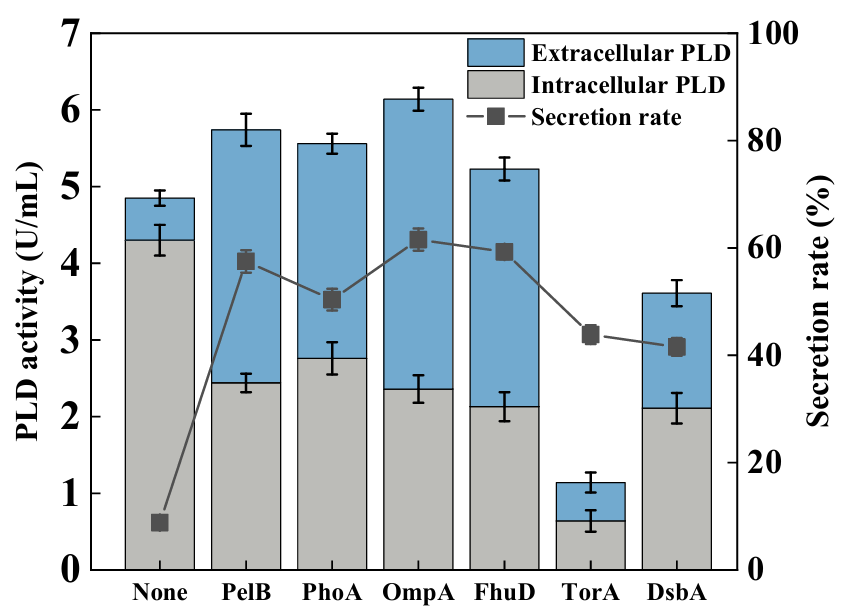Open Access
Article
14 April 2025Efficient Extracellular Production of Phospholipase D in Escherichia coli via Genetic and Process Engineering Modification
Phospholipase D (PLD) is the key enzyme in the catalytic production of rare phospholipids including phosphatidylserine. It was considered a promising method via genetic manipulation for the heterologous production of PLD in the model chassis. Few works focused on the extracellular production of PLD in engineered microbes. Herein, genetic and process engineering modification strategies were developed to achieve secretory production of PLD in Escherichia coli. The N-terminal fusion secretion signal peptide OmpA and the plasmid pBAD-gⅢC with pBAD promoter were proven to be the most effective in promoting the secretory production of PLD. Given the limitation of the cell membrane, the regulation of the key protein expression in the cell membrane as well as the addition of surfactants, were explored to accelerate the secretory production of PLD further. It was indicated that adding 0.5% (w/v) Triton X-100 was more conducive to producing PLD. Finally, fed-batch fermentation was conducted, and the maximum extracellular PLD activity achieved was 33.25 U/mL, which was the highest level reported so far. Our work demonstrated the effectiveness of genetic and process engineering strategies for the secretory production of PLD in E. coli, which provided an alternative platform for the industrial production of PLD.
Open Access
Review
14 May 2025Current Status of Biological Production Using C2 Feedstocks
C2 feedstocks have emerged as promising carbon sources for the biological production of various value-added chemicals. Compared to the traditional C6/C5 sugars-contained/constituted feedstocks, C2 feedstocks have diverse and abundant sources, including non-food biomass, industrial by-products, and C1 gases. This diversification not only eliminates competition with human food demands but also aligns with environmental sustainability goals. Moreover, the metabolic route for C2 compounds to enter central carbon metabolism is more direct, which minimizes the carbon loss and enhances the efficiency of bio-based production processes. This review extensively analyzes three prominent C2 chemicals: ethylene glycol, ethanol, and acetate. After introducing the sources of those compounds, it details the metabolic pathways through which they are converted into acetyl-CoA in vivo. Several chemicals produced from these C2 feedstocks in fermentation are also exemplified. Furthermore, different perspectives are proposed to promote the efficient utilization of C2 feedstocks.
Open Access
Article
19 May 2025Quorum Sensing Systems Engineering for Enhanced iso-Butylamine Production in Escherichia coli
Quorum sensing (QS), characterized by pathway-independence and autonomous control, has been applied in bio-manufacturing, while the lack of versatile and functional regulatory components limits its broader applications. To address this issue, a series of efficient QS systems with diverse properties were established in Escherichia coli. Firstly, combinatorial optimization, including element selection and promoter replacement, led to an improvement of 8.82- and 3.03-fold in output range and response threshold, respectively. Then, a library of LuxR mutants was constructed for screening novel variants with decreased sensitivity to acyl-homoserine lactone through the high-throughput screening technique. Notably, the optimal variant V36E/H89L/P97L exhibited a decrease of 266-fold in the sensitivity. As a proof-of-concept, iso-butylamine biosynthesis was tested by re-directing pyruvate catabolism using QS circuits, and in particular, a total of 15.4 g/L iso-butylamine was generated in strain IB21 during the fed-batch culture, marking a 2.96-fold increase over the static control. Finally, the generated bioproduct reached 44.23 g/L in a bioreactor, representing the highest reported titer so far. In summary, this study not only enriches the genetic toolbox of QS systems, but also facilitates industrial applications in value-added chemical production.


